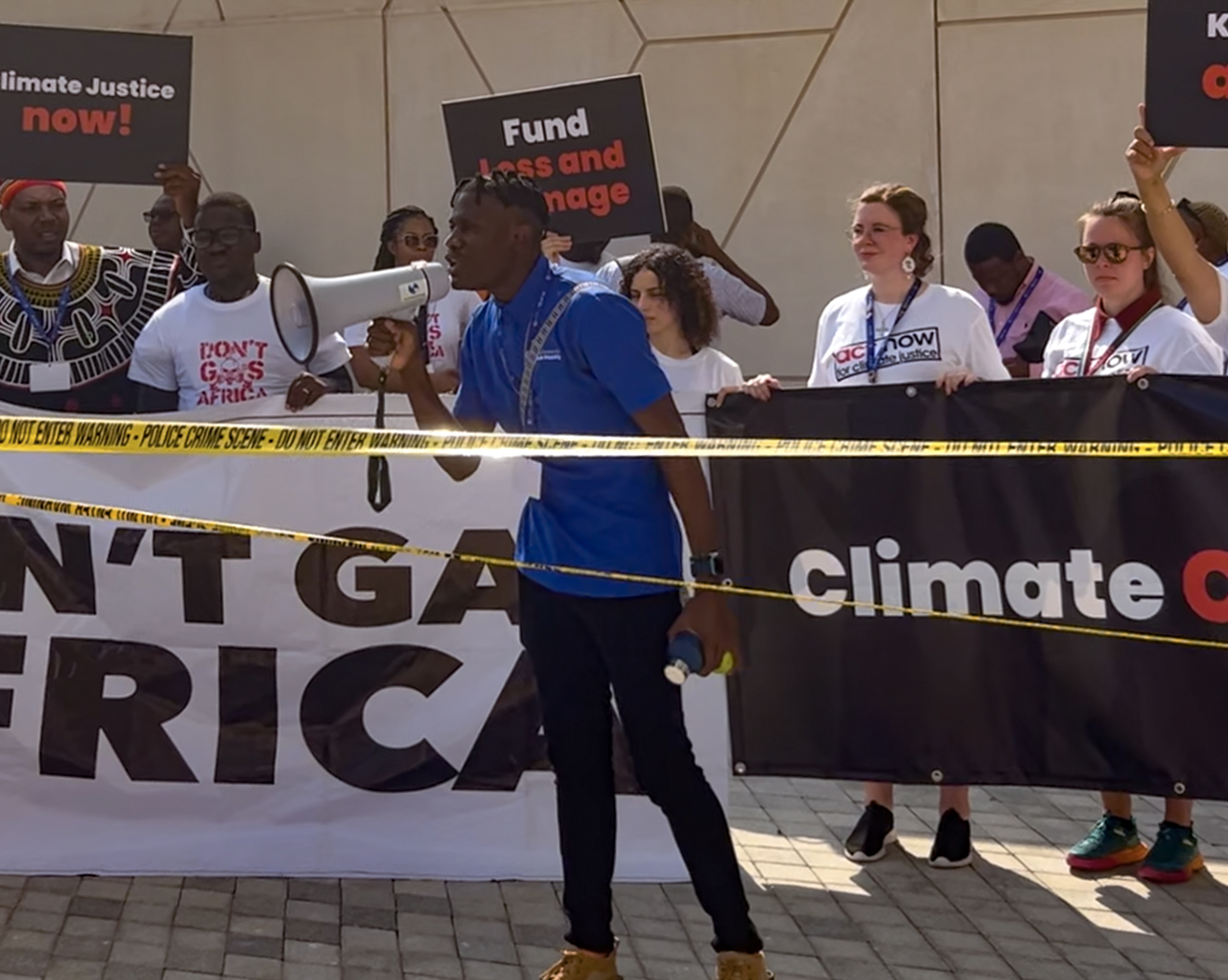By Seth Onyango
A fervent chorus rings out louder and louder as the long queue snaking towards the main entrance of COP28 inches closer. The unrelenting chants of “Don’t Gas Africa” fill the air.
Lorraine Chiponda, accompanied by a battalion of young climate activists, is leading the movement. With placards held high, each emblazoned with compelling messages, their call is unmistakable – a collective stand against new fossil fuel investment.
In the midst of the fray, Chiponda, a trained psychologist, emerges as a figure of resistance to the exploitation of Africa’s natural resources at the expense of its citizens.
“I am very positive about Africa’s future, you see what was happening today… and if you look at what has been happening throughout the year, people are now building consciousness and awareness of climate justice issues of environmental issues,” Chiponda noted.
Born in the mining town of Kwekwe, Zimbabwe, she witnessed first-hand the impact of extractive activities on her community.
The sight of school children arriving at school covered in maroon dust, their uniforms stained by the relentless fallout from nearby mining operations, was a stark reminder of the environmental and social costs of such industries.
Early exposure to the realities of resource exploitation shaped Chiponda’s resolve to fight for environmental justice.
“Growing up in Kwekwe, I saw the effects of mining on our town,” she recalled. “It wasn’t just the landscape that was altered, but the lives of the people, especially the children, who had to live with the consequences every day.”
Chiponda’s journey into activism began during her university days in Zimbabwe, a period marked by governance challenges and student activism. Her early experiences shaped her perspectives, leading her to join ‘Youth for Democracy in Zimbabwe’ and later ‘Natural Justice,’ an organization championing human rights and environmental stewardship.
The campaign was born out of the ‘Africa Movement Building Space’, a collective focusing on climate and developmental issues in Africa. Chiponda and her team recognised the threats posed by the global energy crisis, especially during the Russia-Ukraine conflict, which saw Europe turning to Africa as an alternative energy source.
This realisation sparked the inception of ‘Don’t Gas Africa,’ a movement dedicated to resisting the use of gas as a transitional fuel and instead advocating for renewable energy solutions.
“Africa became a hotspot and became a fuel station for Europe. And so we saw our African leaders at COP 27 pushing for admitting gas as the transmission fuel and we managed to mobilise them to block that at COP27,” she says.
Chiponda’s activism initially focused on coal, leading the Africa Core Network in mobilizing communities against coal mining and at the same time, advocating for a just transition.
However, the shift in global energy dynamics led her to pivot towards addressing the challenges posed by the gas industry in Africa.
According to her, Africa is in a unique and pivotal position, thanks to its abundant renewable energy resources.
“Africa carries more than 40% of the minerals that are needed for a transition. So which means we can better position ourselves to look for data development, understand the arguments where our African leaders say that they need gas, but that is not the solution,” she said.
“Africa also if you look at the geography, we are very much blessed with adequate sunshine with adequate wind and other sources of energy that we can tap into and even be a global leader.”
Chiponda also brings a gender lens to the climate struggle, collaborating with organisations like FEMNET.
She highlights the role of patriarchy in the current climate crisis and the importance of incorporating feminist perspectives in environmental campaigns.
“In terms of gender, we cannot miss that lens because one of the contributing factors with regards to where we are in the world is a result of patriarchy, and patriarchy has led us to where we are with regard to how the economy has been structured around, patriarchy, extractivism and other forms that have affected us at this point,” she asserted.
“So we do work closely with feminist organisations as well as women’s organisations and young people’s organisations across Africa.”
Chiponda is also focusing on expanding the influence of her campaign beyond the African continent.
“Don’t Gas Africa was conceived in Africa by Africans and we also managed to scale up in other regions across the world. That’s why we’ve got Don’t Gas Asia, and hopefully, very soon, we will be having Don’t Gas the Amazon and Don’t Gas Latin America.”
bird story agency
A powerful movement led by Lorraine Chiponda and young climate activists is gaining momentum at COP28, with the rallying cry "Don't Gas Africa." Their goal is to halt new fossil fuel investments and advocate for renewable energy solutions. Chiponda, a trained psychologist from Kwekwe, Zimbabwe, has been deeply influenced by her firsthand experience of the adverse effects of mining on her community.
During her university years amidst political turmoil, Chiponda joined activism groups like 'Youth for Democracy in Zimbabwe' and 'Natural Justice,' steering her toward environmental justice. The campaign 'Don't Gas Africa' emerged from the 'Africa Movement Building Space' in response to the global energy crisis exacerbated by the Russia-Ukraine conflict, positioning Africa as an alternative energy source for Europe. This movement seeks to prevent the continent from becoming a fuel supplier for Europe and instead promote its rich renewable resources.
Chiponda stresses that Africa, with its 40% mineral resources essential for energy transition and abundant renewable resources, can lead global renewable energy initiatives. She also introduces a gender perspective, highlighting patriarchy's role in the current climate crisis and collaborates with feminist and youth organizations like FEMNET to foster a more inclusive environmental movement.
Expanding their reach, Chiponda aims to extend the 'Don't Gas' campaign beyond Africa to regions like Asia, the Amazon, and Latin America, promoting global resistance to fossil fuels in favor of sustainable energy.






